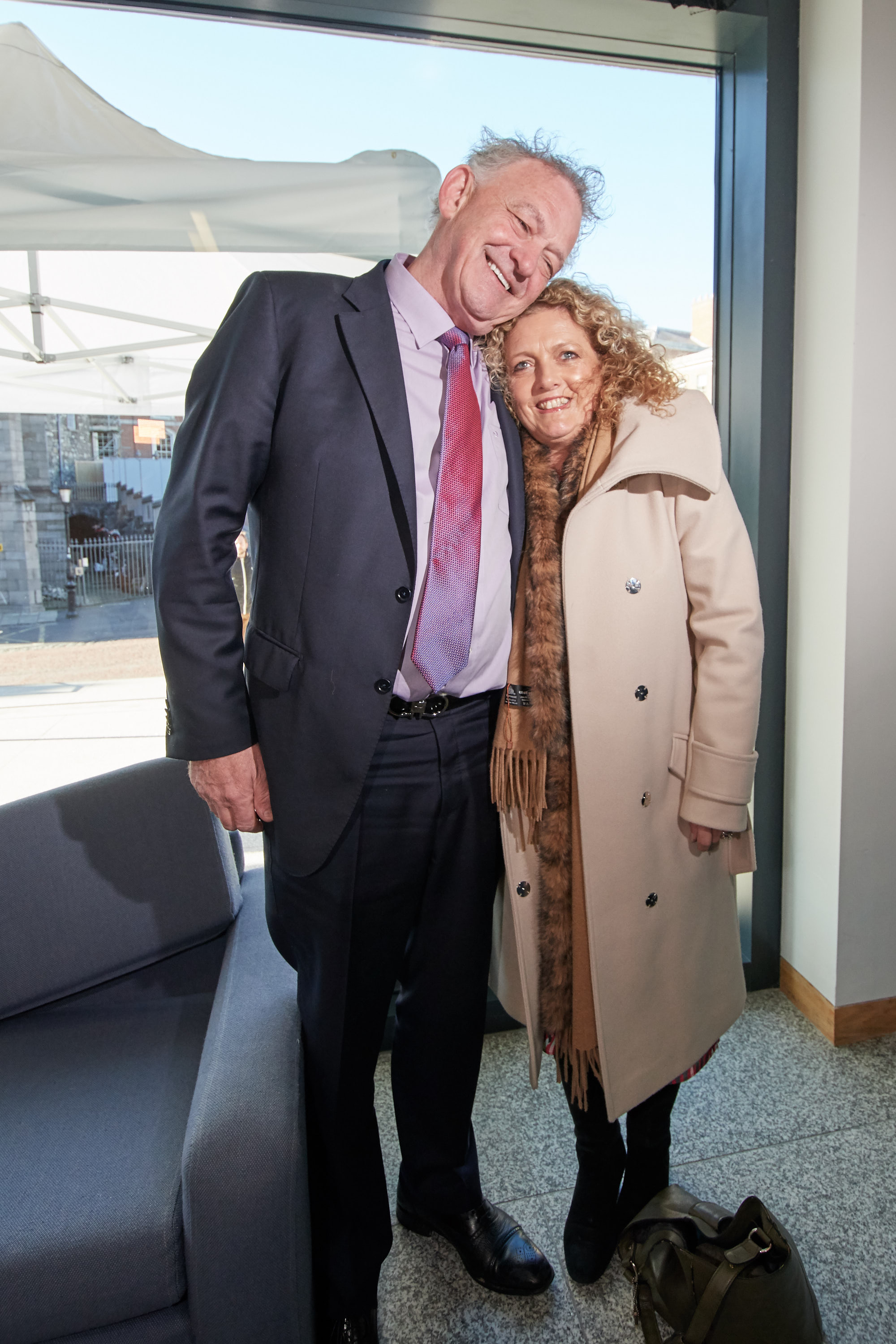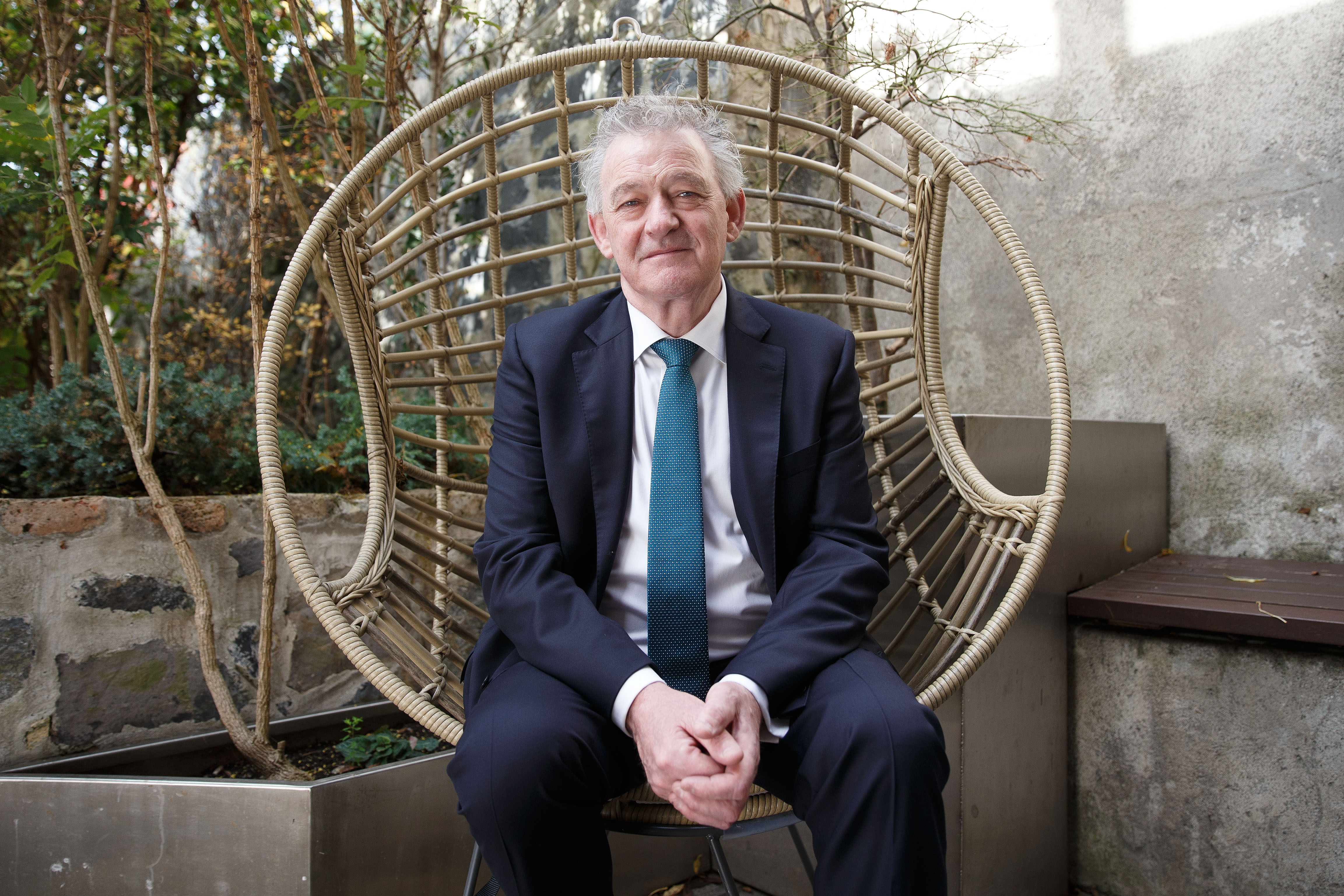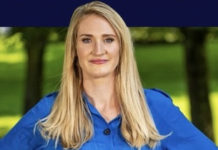By: MICHAEL O’FARRELL
Investigations Editor
It’s 11.30am on the morning after the inauguration of Michael D Higgins and Peter Casey looks tired.
It’s nothing a Red Bull wont put right – though he drinks it from a whiskey tumbler rather than the can.
At 61 Casey is still living fast and hard, trading off his wits and charms as he has always done.
One on one, he’s easy company, speaking without any apparent censure and reeling off a series of jokes on demand. Unfortunately the funniest are just to risqué to print.
One such gag involves Pierre – a French painter who laments that just because of one small indiscretion no one refers to him as the artistic genius he is.
‘Do they call me Pierre, the great artiste?’ Casey – in character – asks in an indignant French accent.
‘No. I make love to just one little sheep….’ goes the punchline.
Casey has a similar problem just now.
The politically correct have branded him as nothing more than a cynical racist as he refuses to filter his vote-garnishing views on travellers.
But beyond the formulaic fishbowl of an election campaign, just who is this man who now believes he can be Taoiseach?
Is there more – or less – to Peter Casey than meets the eye?

One thing is sure – keeping him on track is a tough task.
Like a firecracker tossed on a bonfire he’s liable to fizz off in any random direction without notice.
‘I’m ADHD – totally unmedicated – so you have to get used to that,’ he says.
One of those who helps keep Casey stay on point is his brother Kevin – a Derry solicitor and close confidant.
It was Kevin he turned to when ‘I got myself into this mess in Tipperary with the travellers.’
‘He texted me and he said; ‘Treasure all of the children of the nation equally,’ and I said that’s fucking brilliant – who said that?’
‘He said it’s in the proclamation you plonker.’
Soon afterwards, a stony-faced Casey was on the national airwaves saying; ‘My position is the proclamation says we should cherish all the children of the nation equally, it doesn’t say we should cherish some more than others.’
One curious thing about Casey is that despite growing up in the heart of Derry during the Troubles he never became politicised – or directly involved in the human rights and wrongs of the time.
That’s all the more remarkable given that he is related to one-time IRA chief of staff Hugh McAteer and his brother – Eddie McAteer -who was once leader of the Nationalist Party.
(Casey’s Godmother Angela – his father’s sister – was married to Sean McAteer – a brother of Hugh and Eddie)
Instead, rioting was an exhilarating game for Casey – and an opportunity to collect rubber bullets to sell for profit.
During one riot he went to retrieve a rubber bullet behind a Saracen armoured car just as a nail bomb – a lit stick of gelignite wrapped in nails – landed in front of him.
‘I see the nail bomb and I’m thinking I’ve got a choice; Do I dive behind the wheel of the Saracen or do I run past the fizzling nail bomb and dive behind the wall.
‘In a split second I made the decision to run over the nail bomb and dived in over the wall and next thing it goes off. So that was probably my closest encounter. I couldn’t hear for a couple of days after that.’
That split second impulse remains with Casey to this day.
Though he’s sitting down and outwardly calm it’s as if his mind is spinning ready to go any number of ways at any given moment.
I ask about life at university in Birmingham – a period of his life about which nothing is known – and not for the first time his answer is completely unrelated to the query.
It’s as if the operator of the switchboard of his brain has connected the wrong call.
‘I lost a close friend when I was about 12 – he died of Leukaemia,’ he begins.
‘And I got knocked down twice by motor cars, ended up in hospital twice. I shot myself once (he chuckles) and ended up in hospital for about a week. I had a couple of very close calls and you know my mother always said you know God must have something special for you because you shouldn’t be around by now.’
It’s not that he’s avoiding the question about his university days – it’s just that sometimes his mind goes elsewhere and you just have to go along for the ride.
Once reigned in though, he’s open and unguarded with his memories of college and his favourite student pubs – The Sack and The Pot of Beer.
‘It was brilliant – you know. It was 12p a pint. I used to drink cider. So you know you could get drunk for 50p on a Saturday night – you know – it was a great.’
‘I used to go for yard of ale competitions. I did win one – 2.6 seconds or something for a yard of ale.’
Here – while living on the twelfth floor of a university residence called Laurence Tower – he met his first wife Catherine – a French and business student a year ahead of him.
He also met his best friend Alan Mooney – a Protestant from Coleraine who would later be his best man – with whom Casey formed the university’s Irish Society.
‘We got a grant – so we would have functions and spend the money,’ he chuckles.
It wasn’t all boozing and high jinks. Casey – who was being funded by family back home – had to apply himself to studies as well.
Knuckling down he finished his four year degree in business administration and philosophy in three years.
‘I got very, very into the philosophy – so I ended up getting a first class honours in philosophy.’
Suddenly I find Casey is exposing his love for philosophers such as Jean Paul Sartre, Soren Kierkegaard and Albert Camus.
‘You know the existential philosophy gave me answers that I wasn’t getting from catholicism,’ he says.
He enthuses too about Zooastrianism – the oldest monotheistic religion in the world.

This is not the Peter Casey we saw on the campaign trail.
‘If you’re a Zoroastrian the bar to get into heaven is how much you improve the lives of others,’ he explains.
‘So if you’re a monk and you go into a cave and you don’t play with yourself you won’t get into heaven – you have to give back and you have to help – that’s what makes it a beautiful religion.’
While philosophy was a strong point – that would ultimately lead to a love of India and a long-standing business relationship with the Tata Group – casey struggled with his business studies.
‘I nearly failed the business because I couldn’t do the statistics or the maths.’
After graduating in 1979, with a first class honours in philosophy but a 2.2 overall, Casey worked briefly in London as a salesman for cigarette firm Gallagher’s.
He took the job – with a salary of £3,333 – for the company car. His mother was the beneficiary of the 400 free cigarettes a week he received.
Just three months in, a Xerox executive overheard his sales pitch – which he dramatically recites for me word for word – and hired him on the spot for twice the salary and a better car.
Then one evening after work he walked in to the the Crown and Sceptre pub near Oxford Street and by chance met another Xerox employee called John Cambell.
‘He just standing there drinking – he was from Ireland you know – we had like quite a few drinks on that Friday night.’
A round of golf was arranged for the following day.
‘So I turn up in my little Chrysler Sunbeam – he turns up in a chauffeur-driven Jaguar and I’m thinking we didn’t actually get into what you do for Xerox John – what do you do? He said I’m in charge of Europe.’
Guided by his new drinking and golf buddy, Casey soon found himself headed for Australia where he would eventually leave Xerox to become become a millionaire businessman.
He arrived on November 2, 1981, one of thousands who benefited from Australia’s assisted passage scheme in which immigrants could relocate to the continent for just £10.
‘I remember crying when I got on the plane. We had what is called an Irish wake – we had a couple of them.’
‘I was so miserable and unhappy and homesick.’
That misery was compounded by the fact that – for now – Catherine had remained in London.
‘I remember walking down the street one day and I saw this guy from Derry. I said lets go for a drink and half way through the second pint I remembered I didn’t really like him in Derry – he was an asshole in Derry and not much had changed.’
After a month in the Hilton on York Street he moved in with a sales manager called Tony Coburn (now dead) – who had been in the paratroopers.
‘He came in one night and he just started smashing the place up and started banging my door and I put my bed up against the door to stop him.
‘I used to shoot bastards like you in Derry,’ Tony screamed.
The next morning it was as if nothing had happened.
‘The place was all cleaned up,’ Casey recalls. ‘He’s cooking breakfast saying ‘how are you big man – good night last night.’
‘I’m going what the f**k. I moved out the next day – but he cooked me a nice breakfast.’
Soon though, Catherine would move to Australia – after they were married in Dorset – and in 1984 Casey bought his first home in his own unique way.
‘I thought cash will work. I had about $50,000 in a briefcase. I said to the guy; ‘I like your house and I can move very quickly. I’ve got the cash, I can settle but I need your best price and I need it today.’’
‘We were still about $20,000 apart so I opened up the briefcase and it did the trick – I got the price I wanted.’
The marriage failed after they lost four children during IVF. A fifth was born live but only lived for minutes.
There was no grave.
‘There should have been – that’s one of my regrets. I was in complete denial of the whole thing.’
Was there a name?
‘No – another denial. Another mistake. Should have – absolutely. If I was living my life over again it’s definitely something I’d change.’
Before the year was out Casey met Helen – his current wife.
‘The minute I met her I knew she was the person.’
Helen – who had a boyfriend already – declined his marriage proposal and advances on their first outing together – a day consisting of morning swimming, lunch and dinner.
‘You just want to have sex,’ she told him.
But it wasn’t long before they were married and children began to appear.
Casey was present for the births – though he’d rather have not been. Today he has five children – two sons and three daughters.
‘I don’t recommend that at all. I don’t know why men have to go through that – though in fairness in Australia they did let me take the gas.’
Meanwhile Casey’s businesses in Sydney were booming.
One of them – Trinity People – ran a ‘Champagne campaign.’
‘If you hired a temp for one day we’d give you a bottle of Moet Chandon. For three or four months we were the largest purchaser of Moet Chandon in Australia – and the business exploded – we were drinking it all after work as well. It was bonkers. It’s silly looking back – we were making silly amounts of money.’
Between the birth of their first and second children the couple temporarily moved back to Ireland where Casey set up a new venture – Skydome – that would ultimately fail. As a result his Australian home was repossessed.
The failure was partly down to legal problems but there was another problem too – a surprising one for someone with a proven track record in business.
‘I didn’t understand presumptive rights so when I brought in additional shareholders to fund it I got diluted – and presumptive rights is something you really need to understand before you go there.’
Although he lost his Sydney home, Casey never went bankrupt.
‘I never went bankrupt – and this is another important business lesson – you have to have total disclosure with your banks because you can’t take the knickers off a bare arse. If they know that you have got nothing to hide all they’re doing is wasting legal fees.’
When Helen expressed a desire for an older property to do up in Ireland he knew just what to do.
‘What’s the oldest place you got?’ he asked a local real estate agent who set up a dinner with the owner that Friday night.
The property – Learmount Castle set in 200 acres of gardens and forests – was magnificent but in need of restoration.
‘I bought Learmount that night,’ Casey recalls. I gave him a deposit over the dinner table and wrote out a contract there and then.’
Helen knew nothing of the deal.
‘I took Helen out on the Sunday. It was an amazing, beautiful day and the rhododendrons were flowering and we went inside. There was no electricity but there was gas and these amazing fireplaces and cornices.’
‘I told her I’d just bought it and she went; ‘You what! I hope you’re very happy here but I’ll never live here.’ It took me about five years to sell the damn thing but I ended up making a profit on it.’
Having sold up in Australia the family moved to Atlanta where Casey established recruitment firm Claddagh Resources – and made millions once more.
But a squash injury dating from his time in Sydney persisted and eventually needed surgery after years of steroid injections – often directly into the spine by epidural.
‘I was living on Celebrex and Skelaxin – you know it’s just bad for you – so eventually I had to have the surgery.
‘I had a morphine pump – which I highly recommend. It was brilliant but they wouldn’t let me take it home with me. It’s brilliant. Morphine is just like wow.’
He’s also had recent surgery on both rotator cuffs.
Jokes aside he says he’s never done drugs, can’t take opiate pain relief because they constipate him and that he used medical marijuana ‘for a week or two’ after the surgery.
Just eight weeks before the election campaign Casey was hospitalised in intensive care in Atlanta.
‘I thought I was having a stroke. I was really sick with temperature and my left leg and foot went numb. The next morning the other leg went numb.’
Diagnosed with e-coli, campylobacter and Guillain Barre disease he was treated with Intravenous immunoglobulin (IVIG) – a blood product containing antibodies from the serum of thousands of blood donors.
‘My legs and feet are still numb and my hands feel weird. Stairs is a problem – people think you are drunk or something.’
There are disgruntled employees of Casey’s who have repeatedly claimed online that he is in fact an alcoholic who is routinely drunk in the office.
He denies this outright saying the comments amount to ‘corporate cyber bullying.’
When I ask if he has a problem with alcohol or of he has ever been to AA for addiction issues he replies;
‘Never. I’m blessed with my mother’s genes. I’ve got my mother’s liver. I’ve never had a hangover but the reason is I know when to stop and I don’t drink hard liquor.’
He is proud of his wine cellar in his Donegal home that can hold 2,000 bottles.
‘I love wine. I’m a sommelier with the Confrérie des Chevaliers du Tastevin so I love my Burgandies. I’m an expert in a lot of wines. I did the test. I like good quality wine. Life’s too short to drink cheap wine.’
The Confrérie is an exclusive fraternity of Burgundy wine enthusiasts which owns the 12th century Clos de Vougeot chateau. It counts among its membership many prominent businessmen, luminaries, politicians, military leaders and diplomats.
‘I live life hard and fast but I never go over the line,’ he tells me.
So Where does that sense of control come from?
‘I think partly you get it from your parents… In life discipline is the horse you ride – that’s what my father used to say.’
For Casey that means working out for an hour each day together with a daily dose of milk thistle and a Barocca tablet.
So far – at least – it’s working.
A shorter version of this interview appeared in the print edition of the Irish Mail on Sunday on November 18, 2018. That version is available in PDF format here – https://www.newsscoops.org/wp-content/uploads/2018/11/Peter-Casey.pdf



